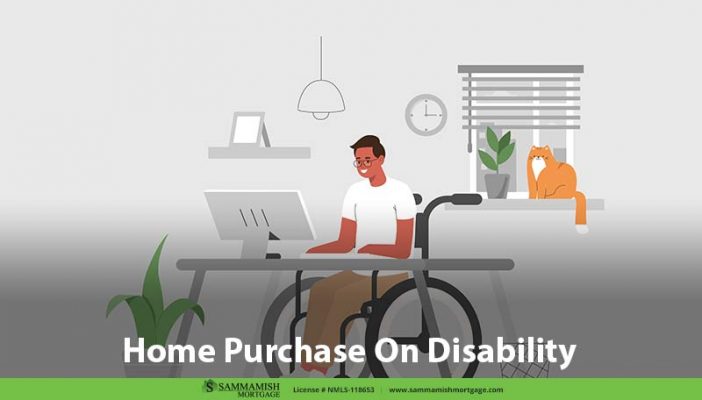No Obligation and transparency 24/7. Instantly compare live rates and costs from our network of lenders across the country. Real-time accurate rates and closing costs for a variety of loan programs custom to your specific situation.

Not only can those with disabilities and disability income qualify for a standard home loan, but they can also get assistance with the entire home buying process thanks to special home buying programs.
Becoming a first-time homebuyer may seem overwhelming at first, especially if you are currently on disability income. But the good news is that making a home purchase does not have to be difficult. In fact, there are a wealth of options, programs available, and more to assist you if you are disabled. Even if you may need a house in a certain area or with specific modifications that may cost more than your prospective budget allows, you can still reach your dreams of homeownership.
Not only does the federal Fair Housing Act protect your rights against being denied a mortgage loan because of your disability, but you are also protected from discrimination, in general, with the Disabilities Act. That said, if you are looking to purchase a home on disability income, there are a few things to keep in mind when embarking on the home buying process.
As long as you receive sufficient regular income that can be verified and you meet all other lender requirements including credit, assets, etc., then there should be no problems with securing financing for your dream home. As briefly mentioned, there are programs available for disabled individuals that can help with the house-buying process. Moreover, a substantial income and a perfect credit score are not necessary for you, or any prospective buyer for that matter, to be able to get a home loan. Thus, even if you have less than desirable credit score and your income is limited to just your disability income, you can still qualify for a mortgage.
By now, you are likely aware that there are a variety of programs available to assist you in purchasing a home. Of course, to qualify for these programs, you must be receiving disability income. That said, Fannie Mae’s Community HomeChoice Program, the Section 8 Homeownership Voucher Program, and the Habitat for Humanity program are just a few of the options available to you. Plus, if you are a disabled veteran, you can be approved for a VA loan along with several VA grants such as the Special Housing Adaptation (SHA) grant and Specially Adapted Housing (SAH) Grant. These particular VA grants help cover the costs for making a home accessible for disabled veterans. What’s more, many of the above-mentioned options also include down payment assistance or require little to no down payment.
Before you begin the actual process of buying a home, it is important to clarify what your needs are in terms of disability. For instance, you may need certain services, proximity to public transportation, and so on. Thus, it is beneficial to figure out what areas can accommodate. Potential buyers should also keep in mind the house’s physical layout, avoiding things like narrow stairwells or long driveways if needed.
Once you have established your needs, then the next step is to determine how much you can afford so you will know what type of home or neighborhood you are looking for. Here, the standard pre-approval process can help you figure out your potential budget.
Overall, as a disabled person, you are protected by the Fair Housing Act that prohibits housing providers—such as lenders, sellers, and real estate agents—from discriminating against you in any area connected to the home-buying process. You are also permitted to make reasonable modifications to the property. Consequently, the entire process is and should be no different than if you were using another source of income to qualify for a home loan.
In addition to expert mortgage assistance with your home buying budget, it is highly recommended that you take advantage of the Department of Housing and Urban Development (HUD) approved housing counselors—if available. Typically, HUD housing counselors are available in every state that is certified to help disabled individuals buy a home. This is particularly helpful if you have specific questions related to your personal needs.
Plus, HUD counselors and a knowledgeable mortgage professional can also point you toward relevant financial assistance programs. This can be extremely helpful when it comes to saving up for a down payment. Clearly, disability income does not always afford a person extra funds that can be scrolled away for a down payment. But that is okay as there are financing options to help you meet down payment requirements. Thanks to programs like the Fannie Mae Community HomeChoice Program, down payment requirements are often less than $500 for those on Social Security Disability. Note, grants, the seller covering the down payment, and the IDA program/down payment savings account are also other down payment options for those on disability.
Ultimately, after figuring out your budget, needs, and down payment, then the home buying process is pretty standard—find an experienced real estate agent, start looking for a suitable home, make a purchase offer, negotiate as needed, get a home inspection, secure homeowner’s insurance, and close on your home.
Do you have questions about home loans or want to learn more about available programs for buying a home on disability income? If so, Sammamish Mortgage can help. We are a local mortgage company from Bellevue, Washington, serving the entire state, as well as Oregon, Idaho, and Colorado. We offer many mortgage programs to buyers all over the Pacific Northwest and have been doing so since 1992. Contact us today with any questions you have about mortgages.


Whether you’re buying a home or ready to refinance, our professionals can help.
{hours_open} - {hours_closed} Pacific
No Obligation and transparency 24/7. Instantly compare live rates and costs from our network of lenders across the country. Real-time accurate rates and closing costs for a variety of loan programs custom to your specific situation.